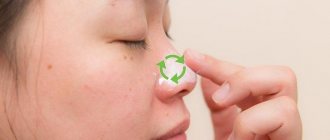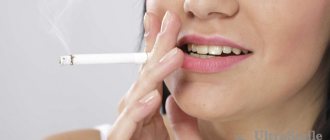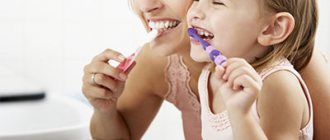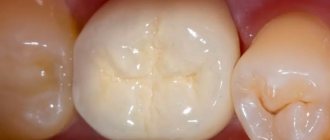In addition to the refreshing and cleansing effect, toothpastes can have a therapeutic or preventive effect. Some help reduce gum sensitivity, others help prevent tooth decay. When purchasing, study the composition and purpose of a specific care product. We'll tell you which toothpastes for caries prevention are popular.
In this article
- The best toothpaste for caries: how to choose
- The best toothpastes for caries prevention
To understand which toothpaste to use to protect against caries, you need to know how this disease develops. Dental caries is a slowly developing pathological process that causes destruction of enamel and hard tooth tissue - dentin.
The main cause of caries is poor oral hygiene, which leads to the proliferation of cariogenic bacteria. The waste products of these microbes, that is, toxins and harmful acids, corrode the enamel and penetrate inside the tooth. This process is accompanied by demineralization—the loss of various minerals and salts by bone tissue and enamel.
The development of caries occurs in several stages. At the initial stage, it can be stopped with the help of remineralization. Dentists prescribe special dental gels and toothpastes with calcium, fluoride and other minerals to the patient. These products can be used not only for treatment, but also as a preventive measure for caries. Some people are predisposed to this disease. But if you maintain hygiene and brush your teeth with medicated paste, the likelihood of caries is significantly reduced. At the same time, you need to understand that only a doctor, and not hygiene products, can completely cure the pathology. Some toothpastes that are marketed as medicinal can only be used for their intended purpose.
The history of the first toothpaste
Brush and paste are the basis of oral hygiene. Now everyone has such a set, but there were times when such devices were considered a real luxury. In Ancient Egypt, sand, ash, ground stones and animal horns were used to clean teeth. Instead of a brush, use your own finger. In the 4th century BC. Hippocrates advised for this purpose to use more gentle mixtures of pumice and wine vinegar. Until the 18th century, the British brushed their teeth with a powder made from crushed bricks, coal chips and crushed bark.
The Americans were the first to improve cleaning powder in the 19th century. It was a mixture prepared on the basis of chalk powder and neutral soap with the addition of fragrances. In 1873, Colgate released the first toothpaste in glass jars, and only 20 years later it began to be sold in convenient tubes. But Soviet people brushed their teeth with chalk-based powder until the 50s of the last century - at that time the first tubes were just beginning to appear on store shelves.
The photo shows the first paste in a glass jar from Colgate
Which product to choose - the best manufacturers
According to dentists, the best toothpaste is the one that fully meets the needs of a particular person. Modern manufacturers have significantly expanded the “functionality” of their products, and now it is not just a means for cleansing plaque, but also an indispensable assistant in the fight against inflammatory processes, hyperesthesia (increased sensitivity of enamel), initial carious processes and many other problems. This is unconditional progress, but along with it another problem has appeared: an incorrectly selected product may not only not bring the desired result, but also cause harm.
What types of toothpastes there are and for what purposes they are intended will be discussed in the next section. But first, it’s worth identifying the primary guideline when choosing a good product – the manufacturer and its reputation. Experts recommend giving preference to brands that have been on the market for a long time and during this time have managed to prove their effectiveness and safety.
In fact, there are quite a few good companies, but Colgate, Blend-a-Med, and Aquafresh are considered priorities. These are brands under which a wide range of different oral care products are produced. Numerous clinical studies have repeatedly proven the high quality and effectiveness of their products. The production process in such corporations is strictly controlled, involves the use of the latest technologies and developments, and the use of high-quality and safe raw materials. These manufacturers have been trusted by both professional dentists and ordinary users for many years.
The best pasta is the one that fully meets the needs of a particular person.
Indications for use
Hygienic products for remineralization are used in the following cases:
- After enamel whitening.
- When white precarious spots appear on the surface.
- With superficial destruction of enamel associated with a general lack of minerals in the body.
It is better to carry out a hygienic procedure at home only as prescribed by a doctor. It serves as an additional measure to maintain a healthy oral cavity, avoids the formation of caries and neutralizes it when the first signs appear.
Note! Using toothpaste is not enough to solve local problems. It serves only as an additional measure to the main dental treatment.
There are specialized cleaning compounds on sale. You can purchase them yourself, without prescriptions or prescriptions. But incorrect use can lead to aggravation of the situation. Using the paste without its intended purpose is permissible in the following cases:
- increased sensitivity when exposed to food of contrasting temperature (hot or cold);
- painful sensations from sour foods;
- low abrasive resistance of enamel, in which scratches quickly appear on the surface;
- darkening of the surface of the teeth even with regular brushing.
Types of toothpastes and their purposes
The range includes products for the prevention of caries, against bleeding gums, for whitening enamel and restoring the pH balance of the oral cavity - this is just a part of the possible uses. The main types are discussed below, based on their “functionality”.
Hygienic for prevention
The main purpose is to keep teeth and oral mucosa clean. They remove plaque well and freshen breath. This also includes children's ones, which act gently and usually have a pleasant taste. This is the best option for daily use if there are no obvious problems with teeth and gums.
Bleaching agents with abrasive particles
The action of whitening pastes is aimed at lightening the enamel using chemical reagents or large abrasive particles. In the first case, bleaching is the result of a chemical reaction of special enzymes, for example, pyrophosphates - they literally destroy bacterial plaque and remove pigmented spots. Abrasive particles make it possible to achieve lightening of the enamel through mechanical action. Here the RDA indicator usually exceeds 80, so they can only be used in courses, not on an ongoing basis. Otherwise, your teeth may become too sensitive.
There is a large selection of abrasive toothpastes
Gum for gentle care
They are characterized by a low content of abrasive particles - no more than 60. Suitable for people with sensitive teeth and damaged enamel. This usually includes mineral components that accumulate in the enamel and contribute to its restoration. An excellent option for cases of hyperesthesia, but only until the condition normalizes. Then you can move on to preventive measures - on the recommendation of the dentist. The fact is that dentures do not do a very good job of cleaning plaque and softening hardening deposits.
“Oh, for me, going to the dentist is almost tantamount to psychological hard labor! The result is half your mouth covered in fillings and increased sensitivity. At the last medical examination, the dentist recommended changing the toothpaste. He says it's too hard for my teeth and gums. I switched to another, gentle one. Within a couple of months, sensitivity was restored and the gums stopped bleeding. It often happens that we ourselves only make things worse, so consultation with a doctor will never be superfluous.”
Rita1985, from correspondence on the forum www.32top.ru
With anti-caries effect
When fluoride and/or calcium are added to the composition, it acquires an anti-caries effect. These components help strengthen dental tissues and prevent caries. Periodic use of such products ensures surface remineralization and increases the resistance of the enamel to the negative effects of external factors. But you shouldn’t use them on an ongoing basis - it may have the opposite effect. If the content of these substances is high, you should first consult a dentist.
Strengthening pastes may contain calcium
Anti-inflammatory action
To restore and strengthen gums, herbal ingredients are usually added. The composition also contains active substances with an antibacterial effect: the antibiotic triclosan, the antiseptic chlorhexidine and others.
The main goal is the destruction of pathogenic microflora, the removal of inflammatory processes and the restoration of soft tissues. Such pastes are usually prescribed as part of maintenance therapy in the treatment of gingivitis and periodontitis. They help in the fight against bleeding and swelling. If potent components are present in high concentrations, use can only be started after the doctor’s approval, and the course itself should last no more than three weeks in a row.
Saline against sore gums
The active components have a positive effect on the condition of the mucous membrane. Salts in high concentrations effectively reduce inflammation by ensuring the outflow of excess fluid from soft tissues, and soothe acute symptoms: pain, swelling, bleeding. Recommended for gingivitis, periodontitis and periodontal disease. Active components improve blood flow and stimulate metabolic processes. The only downside is that it has a specific taste.
Organic with natural ingredients
Products based on plant components do not contain harsh chemicals and provide gentle cleansing. Essential oils and extracts of medicinal plants must be supplemented with surfactants (surfactants) - without them, high-quality cleansing is impossible. It’s another matter if the surfactants themselves are of a plant nature, and then we can confidently call the product completely natural. This is a good choice for children, as well as adults with healthy teeth and gums. However, according to some reviews, the effectiveness of organic products is far from desired. They are not cheap and often cost a lot.
These plant-based products do not contain chemicals.
Types of remineralization
Artificial
The most effective way to restore teeth. It involves dental intervention. This includes:
- Coating the surface with protective varnish.
- Treatment with restorative gels.
- Use of remineralizing toothpastes.
- Thanks to this approach, damaged enamel can be restored faster.
Natural
Suitable for maintaining the mineral balance of the oral cavity, if there are no painful manifestations. Recovery occurs during nutrition, due to the microelements contained in foods. Good results can be achieved by using:
- low-fat cottage cheese;
- hard cheeses;
- legumes;
- low-fat milk;
- green vegetables.
This diet does not provide a therapeutic effect, so if problems arise, you should consult a dentist.
Selection criteria - what to look for
To choose the ideal product for yourself, it is important to take into account many factors at once: the condition of the enamel, the presence of carious processes and tartar, the condition of the gums, age and much more. When you have a clear idea of the current state of the oral cavity, you can move on to specific selection criteria.
Type of pasta
As mentioned above, you need to choose a product based on individual needs and indications. If there are no problems with your teeth and gums, a prophylactic paste would be the best option. If there are problems with the enamel or the condition of the mucous membrane, it is worth considering treatment and preventive options. But in this case, you must first consult a dentist.
You need to choose a product based on individual needs and indications.
Ingredients
Be sure to read the ingredients carefully before purchasing. If there are allergy sufferers in the family, it is important to make sure that there are no components that can provoke allergic reactions. It is advisable to choose products with a minimum concentration of preservatives and foaming agents. Fluoride is often added for an anti-caries effect, but this same component can have the opposite effect if teeth are in contact with it for a long time. It is recommended to use according to indications.
On a note! On the question of how to choose a product based on the stripes on the tube: forget that these designations have anything to do with the composition. In fact, these are just marks for packaging machines that are needed only at the production stage. The color is related to the characteristics of the equipment used and does not indicate anything about the safety of the product.
Baking soda removes plaque well and helps soften hardened deposits. But due to its high degree of abrasiveness, it can easily damage the enamel and lead to its thinning. Therefore, it is advisable to use such products in courses and according to indications. Some compositions are as close as possible to natural ones, but these usually cope worse with their main task, do not foam well and are more expensive. Keep in mind that the concentration of parabens (preservatives) should not exceed 2%, and the surfactant content should be within 1-3%.
Degree of abrasiveness
The presence of abrasive particles ensures high-quality mechanical cleaning of plaque and allows you to return your teeth to their natural whiteness. On the other hand, too long exposure of this kind leads to injury to the enamel, its thinning and hyperesthesia. The abrasiveness indicator is indicated by the RDA marking. If it is a whitening paste, then this indicator can reach 100 units. Conventional preventive – up to 80 maximum, gentle (dental) – no more than 601.
Taste and smell
As for taste and smell, these criteria are left to the discretion of the user. Sometimes a too strong taste can cause unpleasant sensations or even gag reflexes - this also needs to be taken into account.
Taste and color are also criteria for choosing a product
Review of the best products from top manufacturers
Before choosing and buying a product, it will be useful to familiarize yourself with the top popular manufacturers in the selected segment. Above we have already mentioned such well-known companies as Colgate, Blend-a-Med, and Aquafresh - these are reliable manufacturers that you can trust. Now let’s look at a small rating of other brands with the best reputation and proven effectiveness of their products.
Line "Lakalut"
One of the most popular brands in Russia and in the world. The German brand has proven itself well as a manufacturer of high-quality and safe oral care products. The line includes a standard antibacterial paste that is suitable for daily use. There are lactic acid salts here, which provide a pronounced anti-caries effect and help cope with inflammation.
Price: from 180 to 300 rubles for whitening
Splat Lavendercept
Another popular, but this time a Russian brand, offering a wide range of products for various purposes. Lavandasept especially stands out among other Splat products - experts recommend it for sensitive teeth and gums. It copes well with pathogenic microflora, provides antiseptic treatment of tissues, and prevents the spread of inflammatory processes. There is also a small content of whitening components, but they have the most gentle effect and do not pose a threat to the health and integrity of the enamel.
Price: 130 rubles
Hygienic ROCS
A well-known Swiss brand that produces high-quality products with the most natural composition. It was the safety of the active components that helped this brand become so popular and in demand. By the way, the manufacturer’s assortment includes a separate line called “Antitabak”. The main component here is a special enzyme that helps loosen and dissolve tobacco and coffee deposits. Vitamin E provides additional strengthening of dental tissues and prevents their destruction, while baobab extract normalizes the acid-base balance in the oral cavity.
Price: from 260 rubles
PresiDENT "Antibacterial"
A safe composition, as close to natural as possible, is one of the features that distinguishes the products of this brand from similar products on the market. Provides gentle cleansing of plaque, prevents the growth of pathogenic microflora and the development of carious processes. Fluorine is present, but its concentration is minimal. It should also be noted that PresiDENT “Antibacterial” contains a fairly powerful antiseptic chlorhexidine, so experts recommend using it in courses of 2 weeks.
Price: 300 rubles
CREST paste
One of the best representatives of its segment, which is confirmed by numerous enthusiastic reviews from users on the network. The product is not cheap, but effective. Its regular use helps solve a whole range of problems: remove plaque and pigmented spots, whiten enamel (1-2 tones), prevent the development of caries, provide high-quality antiseptic treatment of tissues and freshen breath.
Price: from 650 rubles
SENSODINE line
Another brand with an impeccable reputation and numerous confirmations of the high quality, safety and effectiveness of its products. The products contain natural ingredients, so most of them are suitable for everyday use. They provide complete prevention of caries and inflammatory effects, promote the formation of a protective shell on the teeth and mucous membranes, which prevents the rapid growth of pathogenic microflora.
Price: from 160 rubles
Brand SILCA
The products of this German production are presented in a wide range. The variety of the line makes it possible to choose the option that best suits your specific needs. There are products here with a pronounced anti-caries effect, whitening agents, helping to strengthen the gums and get rid of bleeding. The range also includes preventative formulations suitable for daily use.
Price: from 70 rubles
Dentavit "Sensitive"
This product is suitable for brushing teeth with increased sensitivity - hyperesthesia. Active components help reduce swelling and pain, help restore the condition of not only the enamel, but also the gums. There are no aggressive chemicals that could pose a threat to the health of the oral cavity and the body as a whole. Dentavit “Sensitive” is the optimal choice in terms of price and quality.
Price: 130 rubles
Kobayashi with charcoal and mint herbs
Japanese paste is included in the rating of the best, and also has a powerful whitening effect. Its use allows you to achieve a pronounced and at the same time lasting result with minimal risk of damage to the enamel. The contents of the tube have an unusual black color because it is based on charcoal. It is a natural abrasive with a pronounced absorbent effect. Kobayashi is not suitable for daily use, but it always helps in cases where you need to significantly brighten your smile.
Price: from 450 rubles
"Apadent" with a filling effect
An excellent medicinal paste with nano-hydroxyapatite in its composition helps strengthen enamel and prevents the destruction of dental tissues due to carious processes. The manufacturer claims the filling effect of its product. The product saturates hard tissues with useful minerals and trace elements, provides surface mineralization, effectively relieves acute inflammation, and also prevents the development of caries and gum disease. Suitable also for dentures and sensitive teeth.
Price: from 1200 rubles
Medicinal Mexidol
The Mexidol product is devoid of fluoride and aggressive antimicrobial components. The basis is an active substance of the same name - it effectively eliminates acute signs of the inflammatory process, helps soften hardened dental plaque, and copes well with plaque and age spots from coffee and nicotine. Reduces swelling of soft tissues and normalizes blood circulation in the mucosa. Be sure to consult your dentist before purchasing.
Price: from 160 rubles
Russian brand "Forest Balsam"
Another Russian brand whose products are of high quality and affordable price. The natural formula ensures gentle cleansing of plaque and gentle saturation of dental tissues with beneficial microelements. Plant extracts help reduce swelling during gum inflammation and eliminate bleeding. The product perfectly freshens breath and protects teeth from pathological processes.
Price: from 80 rubles
For smokers
Lacalut White
pros
- Excellent stone removal
- Whitens teeth
- Treats gums
- Quick effect
Minuses
- Price
From 200 ₽
A paste with a preventive effect, aimed at maintaining a beautiful smile for smokers and coffee lovers. Quickly and efficiently whitens teeth and eliminates unpleasant odors. When used, it does not harm any enamel. Not to the gums, but on the contrary, maintains their health.
ROCS Coffee and tobacco
pros
- Fresh breath for a long time
- Removes stains from teeth
- Does not contain fluoride
- Fast acting
Minuses
- Price
From 240 ₽
Daily oral care with this composition will help maintain healthy teeth for a very long time. Gently and at the same time very effectively removes stains and plaque. Binds toxins and quickly removes them from the body. Prevents the appearance of caries. Improves the general condition of the gums and does not contain harmful substances.
Sangi Apadent Total Care, mint
pros
- Suitable for sensitive teeth
- Removes the effects of smoking
- Gently treats gums
- Neutral taste
Minuses
- High price
From 1,100 ₽
Expensive professional grade toothpaste. Cleans and whitens teeth well without causing harm to them. Restores enamel and reduces sensitivity. Does not contain fluorine, so any harmful effects on the body are excluded.
What components should not be there - recommendations for selection
A good oral care product should not only be effective, but also safe. Some manufacturers saturate their products with components, a high concentration of which can cause serious harm to human health in general. When choosing, pay attention to the composition - it is advisable that it does not contain the following components:
- propylene glycol - used as a solvent, including in the production of antifreeze and brake fluid. It has the properties of accumulating in the liver and kidneys, and also contributes to the gradual destruction of cellular proteins,
- Triclosan is a fairly powerful antibiotic that effectively fights pathogenic microflora, but can negatively affect the condition of the kidneys, lungs and digestive organs. The presence of this component requires prior consultation with a specialist,
- parabens are preservatives that can significantly extend the shelf life of the product. However, these substances accumulate in the endocrine glands and can provoke the development of malignant neoplasms. Allowed only in minimal concentrations,
- polyphosphates - used to soften water and stabilize reactions, therefore they are often present in washing powders. When they freely penetrate the body, they increase cholesterol levels and contribute to the development of inflammatory processes.
And these are not all dangerous substances, but they are the ones most often added to increase efficiency and improve cleaning properties. If you have some problems with your teeth or gums, it is best to consult your dentist first. Only a specialist can correctly assess the condition of the enamel and mucous membranes, and then offer the best option for your specific case.
Watch the video “How to choose a toothpaste”
- Kuryakina N.V., Savelyeva N.A. Preventive dentistry, 2003.
Enzyme preparations
Enzyme preparations introduced into toothpastes have a fairly wide spectrum of action.
Enzymes dissolve the organic material of dental plaque without damaging living tissue, have a beneficial effect on periodontal tissue and the oral mucosa, utilize toxic and irritating waste products of dental plaque microorganisms, and have a direct or indirect bactericidal and bacteriostatic effect. Proteases, dextranases, carbohydrase, invertase, mutanase, oxireductase, lactate dehydrogenase, and amylglucosidase were used as components of toothpastes.
Enzymes that have antimicrobial and antiviral effects are also used - lysozyme, ribonuclease, deoxyribonuclease, peroxidase, glucose oxidase, lactoperoxidase.
Quite often, combinations of enzymes are used: carbohydrase, protease and lipase, dextranase, amylase and mutanase, dextranase, amylglucosidase, lactoperoxidase and lysozyme.
Enzyme-containing toothpastes include Biotene (contains glucose oxidase, lactoperoxidase, lysozyme, sodium monofluorophosphate and xylitol), Protodent (contains protease), First Teeth (contains lactoperoxidase and lactoferrin). They are indicated for significant formation of non-mineralized dental plaque, hyposalivation, increased viscosity of saliva, and dysbiosis of the oral cavity. Enzymes are labile compounds, so stabilizers are added to toothpastes (for example, for dextranase, these are gelatin, sodium or potassium chloride, sorbic acid, aluminum hydroxide, eugenol, sodium salicylate, acyl taurate, sorbitol, soluble salts of sulfuric acid).










